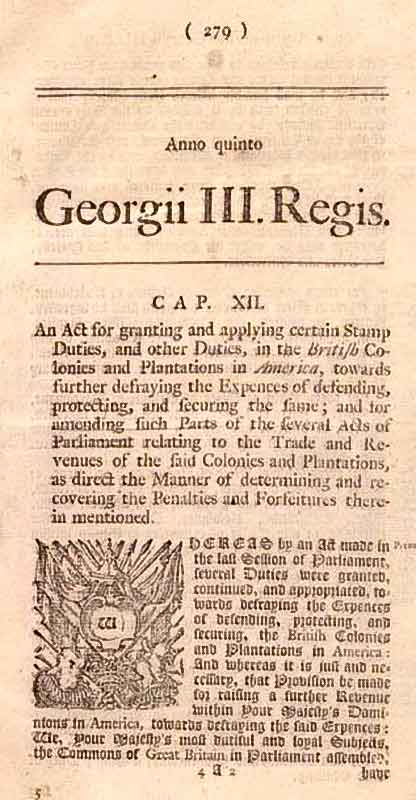 The Stamp Act Congress was held on October 19, 1765 in New York City. It was attended by twenty-seven representatives from what has been known throughout American history as the thirteen colonies. When the British Parliament passed the Stamp Act, colonists were more than eager to show their displeasure towards it.
The Stamp Act Congress was held on October 19, 1765 in New York City. It was attended by twenty-seven representatives from what has been known throughout American history as the thirteen colonies. When the British Parliament passed the Stamp Act, colonists were more than eager to show their displeasure towards it.
More Taxes
The Stamp Act was meant to make the Americans pay bigger and more direct taxes, as a result of a war that has left Britain with lesser treasures and greater debts. It was also passed to help keep troops on America. The Stamp Act was a law that placed taxes on every document. Tax stamps were needed for legal documents, marriage certificates, insurance policies, licenses and many others. Some objects which aren’t even documents such as dices and playing cards also needed tax stamps.
To their surprise, the Colonists did not only show their dislike; they also showed Parliament that they were capable of creating an opposition, and the outrage that would change the fate of Britain, America and quite possible, the whole world.
What the thirteen colonies did next was not really surprising: they sent representatives from their colonies to attend a meeting at the urging of James Otis. After years of being oppressed and manned by the British crown, the Colonists felt that the time had come for them to fight back and claim what is rightly theirs: a land free of oppressors. The twenty-seven representatives came from only nine colonies though; the other four were informed late but couldn’t reach the meeting in time. Timothy Ruggles served the congress as the president, while John Cotton was the congress’ secretary.
A Declaration of Grievances
The meeting paved the way to the Declaration of Rights and Grievances, which stated that there should be no taxes imposed on Colonists without their consent or receive a tax from a body which they have no representative in. The Stamp Act is one of the main reasons why the Colonists even started to think of opposing the English crown at the first place. Many Colonists saw it as a direct violation of their rights. Opposition came in different forms. They were those who had moved silently against the Parliament and the crown, but there were those who were more upfront, more open and more violent.
In 1776, they repealed it and the Stamp Act Congress did a fairly good job. They removed a law that had been nothing but a burden to many Colonists, and did create a sense of unity amongst the thirteen colonies. It was with the Stamp Act Congress that the thirteen colonies realized that much could be done if they worked together.
The terror didn’t stop when the Parliament repealed the Stamp Act. When the British did so, the Declaratory Act was also passed, and states that the British Parliament would have full power and authority to make laws. It was a worse law than the one which came before it, but the resulting realization was enough to fuel one of the greatest wars for freedom in history.